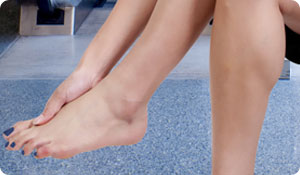
Your feet bear the weight of your entire body and when they're not properly supported or they're expected to bear more than they're designed to carry, they react with pain. The delicate network of bones that make up the feet and allow us to walk and balance can get pushed out of alignment, which can irritate the joints, skin, nerves and connective tissue.
Weight loss, proper hygiene, and the right shoes are among of the most common recommendations doctors make when their patients come in with painful feet and ankles. They might also look for medical conditions associated with foot pain like diabetes and heart disease, (which can cause nerve damage and circulatory problems in the lower extremities) or broken bones. But while those conditions do cause feet to become painful, the most common causes of foot pain are:
- Fallen arches, flat feet, or high arches that don't get enough arch support in a shoe
- Bunions, calluses and corns, often caused by poorly fitting shoes
- Hammer toes that curl down into a claw-like shape
- Arthritis, inflammation of the joints in the foot
- Plantar warts, which form on the sole of the foot and become painful when stepped on
- Bursitis or tendonitis of the ligaments, tendons and surrounding areas
- Morton's Neuroma, a bundle of thick nerve tissue between the toes
- Gout, a disease process caused by buildup of uric acid in the toe
- Sprains, especially in the ankle
- Plantar fasciitis, inflammation of the connective tissue in the bottom of the foot
- Stress fractures, caused by pressure, impact, or trauma
- Fungal infections like athletes foot
Foot Pain Prevention
How do you avoid becoming a foot-pain victim? Try these methods:
1. Wear good shoes with low to medium heels and good arch support. Make sure they're appropriate for the activities you engage in. Don't substitute tennis shoes for running shoes or wear your old Keds to play basketball. Instead, consult a sport shoe expert and invest in the right shoe for your sport. Wear high heel shoes and flip-flops as rarely as possible.
2. Practice good foot hygiene. Wash and dry your feet thoroughly every day, wear clean socks, and contact your doctor if you see any rashes, cuts, sores, or abrasions. Always wear non-skid shoes on wet, slippery surfaces and locker room floors.
3. Exercise regularly and cross train to keep all the muscles in your ankles, legs, and back strong and to prevent overuse injuries in your ankles and feet.
Have your feet checked as part of your regular physical examinations. If you have diabetes or heart disease, have your doctor examine your feet every time you see him/her and as soon as you notice any alterations.





